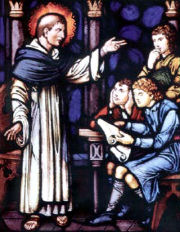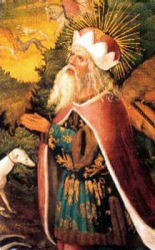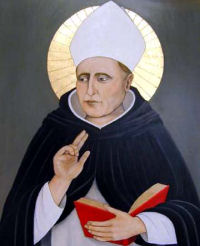Ordinary Time: November 15th
Optional Memorial of St. Albert the Great, bishop, confessor and doctor
Other Commemorations: St. Leopold of Austria (RM)
» Enjoy our Liturgical Seasons series of e-books!
Today the Church celebrates the optional memorial of St. Albert the Great, son of a German nobleman, who was studying at Padua when the Master General of the Dominicans, Jordan of Saxony, succeeded in attracting him to that Order. He was to become one of its greatest glories. After taking his degrees at the University of Paris he taught philosophy and theology at Paris and then in Cologne. St. Thomas Aquinas was among his pupils. His knowledge was encyclopedic. In 1260 he was named Bishop of Ratisbon and devoted himself zealously to the duties of his office. But soon resigned in order to continue his teaching and research. St. Albert died in Cologne on November 15, 1280.
St. Leopold of Austria is not on the Universal Roman Calendar but is included in the Roman Martyrology. He was born at Melk in Austria, a grandson of emperor Henry III. In 1096 he succeeded his father as fourth margrave of Austria. He married Agnes, daughter of Henry IV, by whom he had eighteen children. He ruled firmly and successfully for forty years, and was especially interested in the spread of religious institutions. He was the founder of Mariazell (Benedictine), Heiligenkreuz (Cistercian) and Klosternenburg (Augustinian). He was buried in the last mentioned monastery.
St. Albert the Great
 Albert, the "light of Germany," called the Great because of his encyclopedic knowledge, was born in 1193 at Lauingen, Donau. He studied at Padua, where under the influence of the second Dominican general, he joined the newly-founded Order of Preachers (1223). Soon he was sent to Germany, taught in various cities, particularly Cologne; Thomas Aquinas was his student. In 1248 he received the honor of Master in Sacred Theology at Paris. Throngs attended his lectures.
Albert, the "light of Germany," called the Great because of his encyclopedic knowledge, was born in 1193 at Lauingen, Donau. He studied at Padua, where under the influence of the second Dominican general, he joined the newly-founded Order of Preachers (1223). Soon he was sent to Germany, taught in various cities, particularly Cologne; Thomas Aquinas was his student. In 1248 he received the honor of Master in Sacred Theology at Paris. Throngs attended his lectures.
In 1254 Albert was chosen provincial of his Order in Germany. For a time he lived at the court of Pope Alexander II, who in 1260 made him bishop of Regensburg; two years later, however, he returned to his community at Cologne. There he acted as counselor, peacemaker, and shepherd of souls with great success. He died at the age of eighty-seven. Pope Pius XI numbered him among the ranks of the saints on December 16, 1931, and declared him a doctor of the Church. Much of his life was given to writing. His twenty-one folio volumes are devoted to commentaries on Aristotle (whose works were just then becoming known in the West) and the Bible. Legend credits him with drawing the ground plans for the cathedral at Cologne. Albert, the greatest German scholar of the Middle Ages, was outstanding in the fields of natural science, theology, and philosophy.
—Excerpted from The Church's Year of Grace, Pius Parsch
Albert is named "Doctor Universalis" because of his vast knowledge and writings.
Patronage: Archdiocese of Cincinnati, Ohio; medical technicians; natural sciences; philosophers; schoolchildren; scientists; students; students of theology
Symbols and Representation: crosier of a bishop; cap of the teacher; large book; cross over the sun, the moon and the earth (symbolizing his theological wisdom and knowledge of nature); Man dressed as a Dominican bishop lecturing from a pulpit; man arguing with Saint Thomas Aquinas; Dominican holding a globe, lecturing from a pulpit, or studying
Highlights and Things to Do:
- Learn more about St. Albert:
- Listen to the Catholic Culture podcast: 160—The Vocation of Thomas Aquinas—Matthew Minerd.
- Listen to the Way of the Fathers podcast: 5.17 St. Albert the Great: Universal Doctor By Dr. James Papandrea
- St. Albert is an especially apt patron for scientists because he made his love of truth about nature into an instrument of his love of Christ. See his entry in Dictionary of Scientific Biography.
- See CatholicSaints.info for a treasure trove of links for further reading on St. Albert.
- Read what Pope Benedict XVI wrote about science and faith.
- Saints in Rome details where St. Albert's relics are located. The remains of St Albert the Great rest within a tomb in the crypt of Church of Sankt Andreas (Saint Andrew) in Cologne, Germany.
St. Leopold of Austria
 Born at Melk, Austria, he was educated by Bishop Altman of Passau and succeeded his father as margrave of Austria when he was twenty-three. He married the daughter of Emperor Henry IV, by whom he had eighteen children, in 1106, founded the monasteries of Heiligenkreuz in the Wienerwald, Klosterneuburg, near Vienriazell in Styria, and was known for his piety and charity. He refused the imperial crown when his brother-in-law Henry V died in 1125. Leopold died after reigning as margrave for forty years at Klosterneuburg. He was surnamed "the Good" by his people and was canonized in 1486.
Born at Melk, Austria, he was educated by Bishop Altman of Passau and succeeded his father as margrave of Austria when he was twenty-three. He married the daughter of Emperor Henry IV, by whom he had eighteen children, in 1106, founded the monasteries of Heiligenkreuz in the Wienerwald, Klosterneuburg, near Vienriazell in Styria, and was known for his piety and charity. He refused the imperial crown when his brother-in-law Henry V died in 1125. Leopold died after reigning as margrave for forty years at Klosterneuburg. He was surnamed "the Good" by his people and was canonized in 1486.
—Excerpted from the Dictionary of Saints, John J. Delaney
St. Leopold is the patron saint of Austria. This day is called Goose Day in Austria, another harvest festival that includes traditional menus of roast goose and the drinking of the new wine.
Patronage: Austria (so named in 1663); death of children; large families; Lower Austria; step-parents; Upper Austria
Symbols and Representation: Armed count with a cross on his coronet, a banner with three eagles, and a model of the church of Heiligenkreuz in his hand; before the Blessed Virgin Mary and Saint Anne; hunting with his courtiers, and finding his wife's veil near the monastery of Klosterneuburg; with Saint Jerome; with his building Klosterneuburg; with the Blessed Virgin Mary appearing to him while hunting and the veil nearby
Highlights and Things to Do:
- Find out more about St. Leopold III at CatholicSaints.info.
- Prepare a dinner of Austrian Goulash or some other Austrian dish in honor of St. Leopold, or follow Austrian customs of roasting a goose and drinking new wine. See recipes for Martinmas (November 11) and Michaelmas (September 29).
- Learn more about Klosterneuburg Abbey that St. Leopold founded and the Canons Regular of Saint Augustine.






